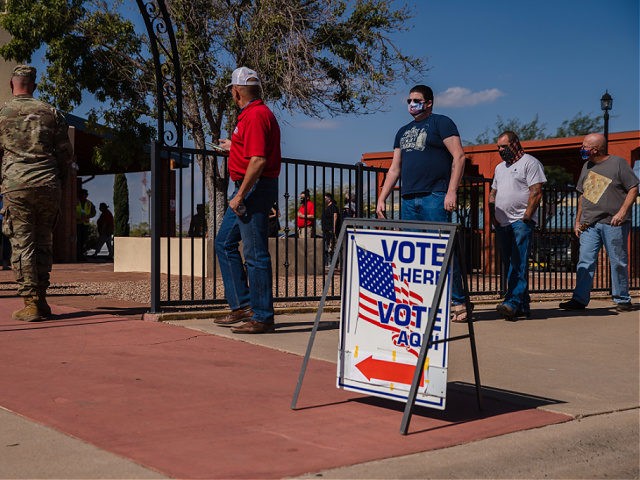A bill that prohibits the private funding of election administration moved one step closer to becoming law in Arizona on Tuesday.
The Arizona State Senate, acting as a Committee of the Whole, moved HB 2569, a bill proposed by State Rep. Jake Hoffman (R-Queen Creek), on to the final step in the legislative process in a voice vote on Tuesday afternoon. That final step — a third reading with recorded votes on the floor of the senate — is expected to take place on Thursday.
Republicans hold a 16 to 14 majority over Democrats in the state senate, and the bill is expected to pass.
This month, the Arizona House of Representatives passed HB 2569 in a strictly partisan 31 to 29 vote.
If the state senate passes the bill on Thursday, it will then go to the desk of Gov. Doug Ducey (R-AZ) for his signature.
The entire bill is expressed in a single sentence: “Notwithstanding any other law, this state and a city, town, county, school district or other public body that conducts or administers elections may not receive or expend private monies for preparing for, administering or conducting an election, including registering voters.”
Phill Kline, executive director of the Amistad Project of the Thomas More, considers the Arizona legislation a model for other states to follow to prevent the controversial private funding of election administration conducted in key battleground states in the 2020 presidential election by the Center for Technology and Civic Life, which received $350 million from Facebook founder and CEO Mark Zuckerberg and his wife Priscilla Chan.
Kline told Breitbart News Arizona’s HB 2569 is “far superior” to bills proposed in other state legislatures whose intent is to prohibit the private funding of election administration “because it does not permit an end run in which private funding could go first to the county authority and then to the board of registrars.”
“Arizona is positioned to lead the nation in protecting our citizens’ civil right to free, fair and secure elections,” state Rep. Hoffman, the bill’s sponsor, told Breitbart News in an exclusive interview.
“It is a constitutional and moral imperative that as a legislature we prescribe the most secure manner of administering elections possible, which includes defending against the Democrats’ abhorrent, disenfranchising policies that seek to disproportionally tip the scales of our elections in their favor,” Hoffman added.
Rick Manning, president of Americans for Limited Government, praised Hoffman for his leadership role in the Arizona election integrity legislation.
“Representative Hoffman is setting the example for effective, common sense governance for lawmakers all across the country. His election integrity legislation that eliminates the hypocritical double standard of the political ‘elites’ by including criminal penalties for failure to comply with the law should be modeled and passed by every state legislature in America. Period,” Manning said.
As Breitbart News reported in December:
A report released by the Amistad Project of the Thomas More Society at a press conference on Wednesday alleged Facebook founder Mark Zuckerberg and his wife made $419.5 million in contributions to non-profit organizations during the 2020 election cycle–$350 million to the “Safe Elections” Project of the Center for Technology and Civic Life (CTCL) and another $69.5 million to the Center for Election Innovation and Research–that, “improperly influence[d] the 2020 presidential election on behalf of one particular candidate and party.”
“The 2020 presidential election witnessed an unprecedented and coordinated public-private partnership to improperly influence the 2020 presidential election on behalf of one particular candidate and party. Funded by hundreds of millions of dollars from Facebook founder Mark Zuckerberg and other high-tech interests, activist organizations created a two-tiered election system that treated voters differently depending on whether they lived in Democrat or Republican strongholds,” Amistad Project Director Phill Kline wrote in the report’s executive summary.
The report identified three key actions that, taken together, “represent the beginning of the formation of a two-tier election system favoring one demographic while disadvantaging another demographic.”
- Private monies dictated city and county election management contrary to both federal law and state election plans endorsed and developed by state legislatures with authority granted by the United States Constitution.
- Executive officials in swing states facilitated, through unique and novel contracts, the sharing of private and sensitive information about citizens within those states with private interests, some whom actively promote leftist candidates and agendas.
- Swing state governors also started issuing emergency executive orders shutting down in-person voting while pouring new state resources into encouraging persons to vote in advance. Polling data revealed this coordinated assault on in-person voting generally favored Democrat Party voters who preferred to vote in advance, while placing Republicans, who preferred to vote in person, at a disadvantage. These actions represent the beginning of the formation of a two-tier election system favoring one demographic while disadvantaging another demographic.
Also on Tuesday afternoon, the Arizona State Senate, acting as a Committee of the Whole, approved HCR 2023, a concurrent resolution opposing attempts by Democrats to federalize state elections in HR 1, SR 1, referred to by Democrats as the “For the People Act” and referred to by Republicans as the “Corrupt Politicians Act.”
Two other bills on election integrity reform have seen progress in the Arizona State Senate as well.
HB 2792, which bans the mass mailing of ballots to voters who have not requested them, passed out of the State Senate Judiciary Committee and is awaiting a floor vote, and HB 2794, which prohibits agents of the state government from modifying or agreeing to modify statutorily prescribed election dates and deadlines will be heard in the State Senate Appropriations Committee on Wednesday.

COMMENTS
Please let us know if you're having issues with commenting.